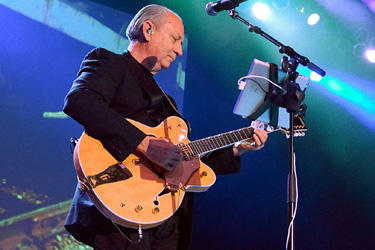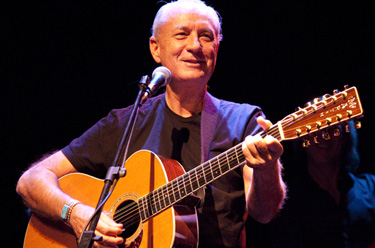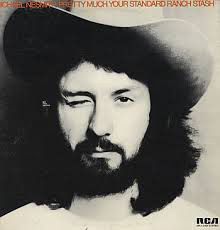"I was actually staying with John at his home and the "Day in the Life" sessions came up and he invited me. It was like a party but with a really good band."
Michael Nesmith Kicks Off Solo Tour at MIM October 27th
An Interview By Mariah Fleming

Singer-songwriter Michael Nesmith, a pivotal force in popularizing country rock music, most notably in his work with "The First National Band", launches his fall US solo tour in Phoenix at the Musical Instrument Museum on October 27th at 7pm. For tickets go to TheMIM.org. Nesmith first caught the public eye as one fourth of "The Monkees." But it is his prolific body of solo work spanning nearly five decades that has earned this Renaissance man legions of devoted fans. Among other achievements, Nesmith has recorded at least fifteen solo albums, authored several books, created a groundbreaking television show, produced films, invented what became MTV and penned the song "Different Drum" that set Linda Ronstadt's career in motion. Nesmith gives us a closer look inside his fascinating world in the following interview.
Q. How did you come to choose the MIM for your first gig on this solo tour?
A. John Jorgenson introduced me to the facility and I loved it. He invited me to play there and I was very impressed with its state of the art technology stage and just the general attitude of the people who worked there -- very dedicated to music and its legacy.
Q. Did you have a chance to go through the Musical Instrument Museum when you were here not long ago on the Monkees tour?
A. I did not go through the Museum last visit but I hope to change that this time.
Q. What can we look forward to hearing at your MIM show on October 27th?
A. The show is built around songs I wrote. In each one is a little narrative that lives in my mind -- a movie of the mind so to speak -- and I use those movies as settings for the songs and I introduce the songs with those settings. It is very much a sit and enjoy the music and musicianship kind of show. It is intense emotionally, but much more in the mind than dancing in the aisle.

Q. Your writing is informed by deep sentiment, wry wit and sensitivity. From where do you think you got your humor and sensitivity? Were you a sensitive kid?
A. I can't say for certain -- I was encouraged early on by people I respected to develop a spiritual sense of things and that sense served me well over the years in informing all the artistic endeavors I have undertaken.
Q. About your songwriting, the word 'mystical' comes to mind. Even with something like "El Dorado to the Moon" there's a depth there that's compelling. For you, how does a song emerge?
A. "Emerge" is the right word if by that you mean the appearing of something that is already there. Songs have an eternal quality that is revealed as they are sung. So I start out singing whatever comes to mind -- nonsense words and wandering melodies -- and if I stay with that, slowly a song will form. It is great fun and something that cannot be done self-consciously. The consciousness of the song has to overtake all else and then it appears already written.
Q. You've done so many creative things in your life…music, TV, books. If you'd had to choose only one of those creative pursuits, what would it have been?
A. Writing -- it is for me a primary art -- words are an infinite palette.
Q. Your groundbreaking TV show "Television Parts" touched political and social topics in a way that may have been hard for censors to catch. When I interviewed Tom Smothers he talked about creatively getting around censorship on "The Smothers Bros Comedy Hour". During "Television Parts" did you have any problems with censors?
A. The main struggle was having to add a laugh track. I didn't want one but the network insisted. Censors left us alone -- as far as I know.
Q. Speaking of "Television Parts", in "Dr. Duck's Super Secret Sauce Promo" you've got a who's who of comedic celebrities like Jay Leno, Jerry Seinfeld, Martin Short, Bobcat Goldthwaite, Garry Shandling and Martin Mull. How did they all wind up being involved in that?
A. They were all more or less starting out and I was familiar with their work. They were doing stand up comedy at the various clubs around and I went every night and watched them all. When I really laughed hard I invited them to be on the show.
Q. Over the course of your career, you've always been way ahead of your time. You invented the idea for what became MTV. What do you think of the MTV of today?
A. It's not the same idea as the original -- and I have almost completely stopped watching TV except for some of the cable series.
Q. I've read that John Lennon invited you to the orchestral session for the Beatles "A Day in the Life". How did that come about and what was it like to be there?
A. I was actually staying with John at his home and the sessions came up -- and he invited me. It was like a party but with a really good band.
Q. Looking back over your career, is there anything that leaps out at you as being a pivotal move on your part that set the course for your success?
A. The path has wandered this way and that like water flowing downhill and I never quite knew from moment to moment what to expect. I don't think I can point to any event that was causal. I think of events as effects and I didn't really make any "moves" that I was aware of. Larger forces seem to have been at work.
October 17, 2013
Contact the author of this article at Editor@MusicAndMoreAZ.com.